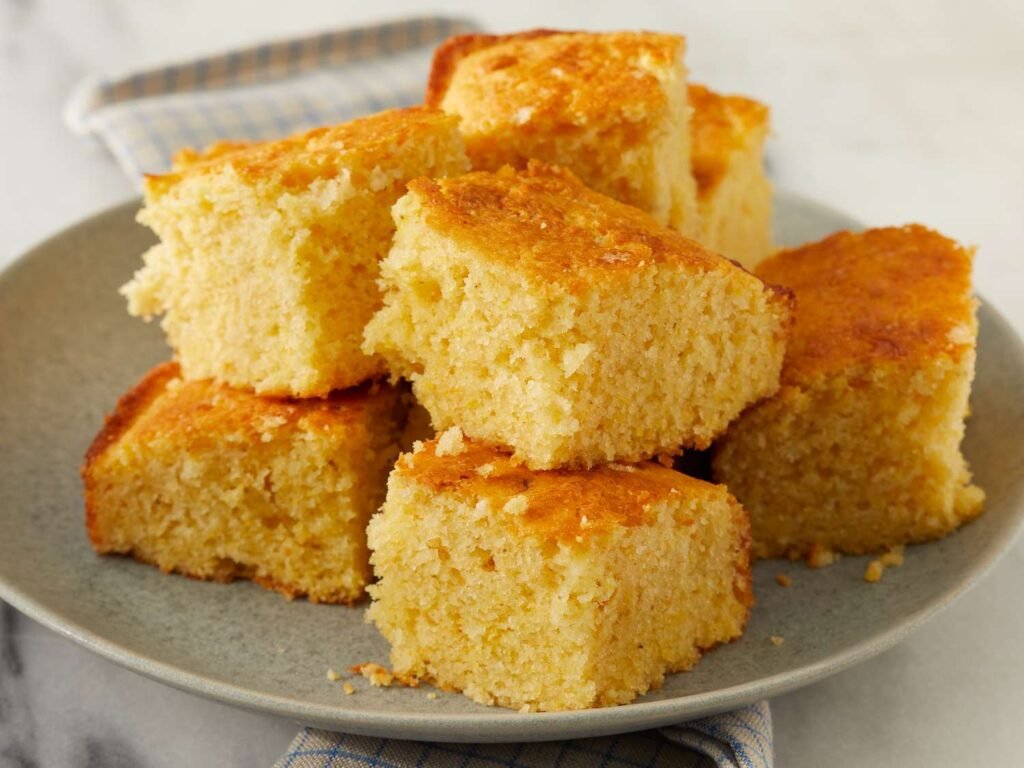Can Dogs Eat Cornbread? A Comprehensive Guide for Pet Owners
Dogs are part of our families, and we often want to share everything with them, including our food. Cornbread, with its soft texture and warm taste, may seem like a harmless treat for our furry friends. However, understanding the effects of this food on your pet’s health is essential before offering it. In this guide, we’ll explore whether cornbread is safe, any potential health risks, benefits, and tips for giving it to them responsibly.

1. What is Cornbread?
Cornbread is a popular baked good made primarily from cornmeal, flour, eggs, milk, and sometimes sugar. This comfort food can be served in various ways—plain, with added ingredients like jalapeños or cheese, or as a side dish to a hearty meal. While generally safe for humans, not all ingredients in cornbread are equally harmless for pets.
2. Is Cornbread Safe?
Yes, it is generally safe in small amounts. The key here is moderation and attention to ingredients. Corn itself isn’t harmful to most pets, and many can digest it well. However, certain ingredients, like excessive sugar, butter, and added spices, can pose health risks. If made without harmful additives, plain cornbread can occasionally be shared as a treat.
Ingredients to Avoid
If you’re making this food at home or purchasing it, avoid giving any if it contains:
- Onions or garlic: Toxic and can cause serious health problems.
- Excessive sugar or sweeteners: Pets don’t process sugar well, and artificial sweeteners like xylitol are toxic.
- Spices or herbs: Some recipes include ingredients like jalapeños, which can irritate a pet’s digestive system.
- Butter or excessive fats: These can lead to obesity and even pancreatitis if consumed regularly.
3. Nutritional Content of Cornbread
Cornbread can offer a few nutritional benefits in moderation. Cornmeal provides some carbohydrates and dietary fiber, which can aid digestion and provide energy. However, the nutritional benefits are relatively minor compared to foods specifically designed for pets.
Key Nutrients:
- Carbohydrates: Cornmeal is a good source, giving pets a boost of energy.
- Dietary Fiber: Fiber aids in digestion, but animals generally get sufficient fiber from their regular diet.
- Protein and Fat: Contains some protein and fat, but these are minimal compared to other foods.
4. Benefits of Cornbread
While this treat isn’t a nutritional powerhouse, it can provide minor benefits when offered sparingly:
- Quick Energy Boost: The carbohydrates in it can provide a quick source of energy.
- Digestive Aid: The fiber can be helpful for those with mild constipation, although there are better sources for fiber.
- Bonding Treat: It can be a treat for bonding and training purposes, especially if your pet enjoys the taste.
5. Risks and Drawbacks
Despite possible benefits, cornbread does come with risks when given in large quantities or if ingredients aren’t carefully chosen.
Digestive Upset
This treat can be heavy on a pet’s digestive system, especially if they’re not used to it. Consuming too much can cause symptoms like diarrhea, bloating, and stomach discomfort.
Obesity
Cornbread can contain high calories due to added fats and sugar, leading to weight gain if given regularly. Obesity can lead to more severe health problems, like heart disease and joint issues.
Allergic Reactions
Some pets have corn allergies or sensitivities, which can result in itching, skin irritation, or digestive upset. Always start with a small amount to ensure they don’t react negatively.
Additives and Toxins
Store-bought options often contain preservatives and additives that aren’t healthy. Homemade cornbread allows you to control the ingredients, making it a safer option if you want to give a small piece to your pet.
6. How to Offer Cornbread Safely
If you want to give your pet a small piece as a treat, here’s how to do it safely:
Portion Control
Limit to an occasional treat rather than a staple. A small bite-size piece every now and then is enough without overloading your pet with unnecessary calories.
Homemade is Best
When possible, make cornbread at home using pet-friendly ingredients. Avoid sugar, butter, and any spices. Consider using ingredients like rice flour or oat flour if your pet has a corn sensitivity.
Watch for Allergic Reactions
The first time you offer it, monitor closely. Look for any signs of itching, ear infections, or digestive upset. If you notice any unusual behavior, discontinue offering cornbread.
7. Alternatives for Pets
If you’re looking for safer alternatives that still feel like a special treat, consider these options:
- Pumpkin: High in fiber and good for digestion, pumpkin is a tasty treat for many pets.
- Carrots: Crunchy and low in calories, carrots can be a satisfying snack.
- Plain, Cooked Sweet Potatoes: Sweet potatoes provide nutrients and are safe when cooked and served plain.
- Apples: Sliced apples (without seeds) are a great treat and provide fiber and vitamins.
8. Conclusion
In summary, cornbread can be given in small amounts, provided it’s plain and free of harmful ingredients. While it won’t add much nutritional value, it can serve as an occasional treat for bonding moments or training. However, be cautious about any ingredients that might be harmful, and always prioritize moderation.
If your pet loves the taste, consider baking a homemade, pet-friendly version so you can control the ingredients. But remember, while it is safe occasionally, it should never replace a balanced, nutrient-rich diet specifically designed for pets.
Ultimately, understanding what foods are safe allows you to share treats responsibly, ensuring your furry friend stays happy and healthy.
